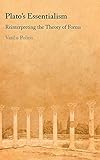Plato's essentialism : reinterpreting the theory of forms / Visalis Politis.
Material type: TextPublisher: Cambridge ; New York : Cambridge University Press, 2023Copyright date: ©2021Edition: First paperback editionDescription: x, 251 pagine ; 23 cmContent type:
TextPublisher: Cambridge ; New York : Cambridge University Press, 2023Copyright date: ©2021Edition: First paperback editionDescription: x, 251 pagine ; 23 cmContent type: - testo (txt)
- senza mediazione (n)
- volume (nc)
- 9781108833660
- 9781108986557
- B 398.F57.P65 2021
| Item type | Current library | Call number | Status | Barcode | |
|---|---|---|---|---|---|
 Opera (Magaz.)
Opera (Magaz.)
|
Biblioteca "Angelicum" Pont. Univ. S.Tommaso d'Aquino Temporary Library | B 398.F57.P65 2021 (Browse shelf(Opens below)) | Available | 0030219727 |
Include bibliografia (pagine 235-242) e indici.
1. Why cannot the 'ti esti' question be answered by example and exemplar? Hippias Major -- 2. Why cannot essences, or forms, be perceived by the senses? Hippias Major. Phaedo. Republic -- 3. Why are essences, or forms, unitary, uniform and non-composite? Why are they changeless? Eternal? Are they logically independent of each other? Phaedo and Republic -- 4. The relation between knowledge and enquiry in the Phaedo -- 5. Why are essences, or forms, distinct from sense-perceptible things? Phaedo 74 and Republic V. 478-479 -- 6. Why are essences, or forms, the basis of all causation and explanation? Phaedo 95-105 -- 7. What is the role of essences, or forms, in judgements about sense-perceptible and physical things? Republic VII. 523-525 -- 8. Why does thinking of things require essences, or forms? Parmenides -- 9. Why are essences, or forms, separate from physical things? Also Timaeus and Philebus -- 10. What yokes together mind and world? Phaedo 99-100 and Republic VI. 505-509 -- Conclusion. Forms simply are essences, not things that have essences.
In this book, Vasilis Politis argues that Plato's Forms are essences, not merely things that have an essence. Politis shows that understanding Plato's theory of Forms as a theory of essence presents a serious challenge to contemporary philosophers who regard essentialism as little more than an optional item on the philosophical menu. This approach, he suggests, also constitutes a sharp critique of those who view Aristotelian essentialism as the only sensible position: Plato's essentialism, Politis demonstrates, is a well-argued, rigorous, and coherent theory, and a viable competitor to that of Aristotle. This book will appeal to students and scholars with an interest in the intersection between philosophy and the history of philosophy.


